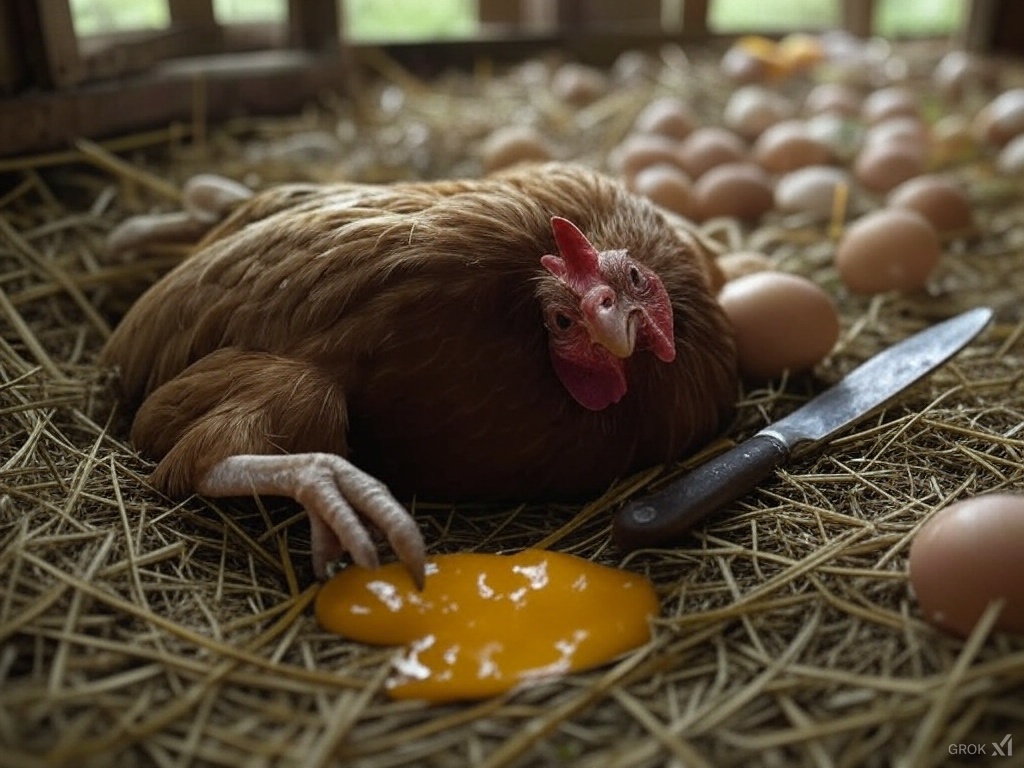"Shā Jī Qǔ Luǎn" (杀鸡取卵) - Don't Kill the Chicken to Get the Egg!

Imagine someone so impatient for an egg that they kill the chicken hoping to get it instantly. This absurd and destructive act is perfectly captured by the Chinese idiom "Shā Jī Qǔ Luǎn" (杀鸡取卵). It’s a powerful warning against greed and short-sightedness, highlighting the foolishness of destroying the source of future benefits for a tiny, immediate reward. Let's explore the meaning of this vivid idiom!
Pronunciation and Breakdown:
- Shā (杀): (Pronounced: shā, Tone 1 - high and level tone) - To kill, to slaughter
- Jī (鸡): (Pronounced: jī, Tone 1 - high and level tone) - Chicken
- Qǔ (取): (Pronounced: qǔ, Tone 3 - falling-rising tone) - To take, to get, to obtain
- Luǎn (卵): (Pronounced: luǎn, Tone 3 - falling-rising tone) - Egg, ovum
Breaking it down, "Shā Jī Qǔ Luǎn" literally means "kill the chicken to get the egg." The imagery is stark and unforgettable, instantly conveying the idiom's cautionary message.
Origin and Story: A Fable of Impatience and Greed
The idiom "Shā Jī Qǔ Luǎn" is derived from a simple yet impactful fable that has been passed down through Chinese culture. While there isn't one single definitive historical origin story, the underlying concept is timeless and universally understood.
The fable usually depicts a person who owns a hen that lays a golden egg every day. Initially, the person is overjoyed with this daily treasure. However, driven by greed and impatience, they become dissatisfied with getting only one egg per day. They foolishly believe that the chicken must contain a large number of golden eggs inside its belly. In their eagerness to get all the eggs at once, they kill the chicken.
Of course, upon opening the chicken, they find no extra golden eggs, only the ordinary insides of a chicken. They have lost not only the potential for future golden eggs but also the source of their daily income. Their greed and short-sightedness have resulted in complete loss.
This simple fable powerfully illustrates the consequences of "Shā Jī Qǔ Luǎn" and the dangers of prioritizing immediate gratification over sustainable benefit.
Meaning and Usage: Destroying the Source of Future Benefit
"Shā Jī Qǔ Luǎn" (杀鸡取卵) means: to kill the chicken to get the egg; to sacrifice long-term benefit for immediate gain; to be penny-wise and pound-foolish; to destroy the source of future prosperity out of greed or impatience.
This idiom is used to criticize short-sighted actions driven by greed or impatience that ultimately lead to greater loss. It applies to various situations where people or organizations prioritize immediate, often small, benefits at the expense of long-term sustainability and larger potential gains.
Examples in Context:
- "Overfishing in the ocean is like shā jī qǔ luǎn. By catching too many fish now, we deplete fish populations and harm the long-term health of the ocean ecosystem, ultimately hurting the fishing industry itself." (Environmental/Economic issue)
- "A company that excessively exploits its employees for short-term profits is practicing shā jī qǔ luǎn. Employee burnout and high turnover will eventually damage productivity and long-term success." (Business/Human Resources issue)
- "Taking out a high-interest payday loan to cover immediate expenses can be shā jī qǔ luǎn. The short-term relief comes at a high price with long-term debt and financial strain." (Personal Finance issue)
- "Cutting down ancient forests for quick timber profits is shā jī qǔ luǎn. It destroys biodiversity, disrupts ecosystems, and diminishes long-term environmental and economic value." (Environmental/Economic issue)
Cultural Significance: Wisdom of Long-Term Perspective and Moderation
"Shā Jī Qǔ Luǎn" embodies important Chinese cultural values that emphasize prudence, long-term planning, and moderation. It reflects the importance of:
- Long-Term Thinking (长远考虑 - Chángyuǎn kǎolǜ): Considering the future consequences of actions. Prioritizing sustainable growth and lasting benefits over fleeting, immediate rewards.
- Patience and Moderation (耐心与节制 - Nàixīn yǔ jiézhì): Avoiding greed and impatience. Understanding that true prosperity often requires time, careful nurturing, and avoiding excessive or destructive actions.
- Sustainable Practices (可持续的做法 - Kě chíxù de zuòfǎ): Valuing the source of benefit and ensuring its continued viability. Recognizing that destroying the source ultimately undermines long-term prosperity.
- Avoiding Greed (避免贪婪 - Bìmiǎn tānlán): Recognizing greed as a destructive force that can lead to foolish and self-defeating actions. Emphasizing contentment and balanced pursuit of gain.
Why This Idiom Matters in Chinese Culture: "Shā Jī Qǔ Luǎn" is a powerful and easily understood metaphor that encapsulates the dangers of short-sightedness and greed. It serves as a constant reminder to prioritize long-term sustainability, to be patient and moderate in our pursuits, and to value the sources of our prosperity. It’s a piece of timeless wisdom applicable to individuals, businesses, and societies as a whole.
Synonyms and Related Concepts:
-
Chinese Synonyms:
- 竭泽而渔 (jié zé ér yú): "Drain the pond to catch fish." - Very similar meaning, focusing on environmental resource depletion.
- 饮鸩止渴 (yǐn zhèn zhǐ kě): "Drink poison to quench thirst." - Seeking immediate relief through harmful methods.
-
English Equivalents:
- Kill the goose that lays the golden eggs: Direct and very common English equivalent idiom with the same meaning and fable-like quality.
- Penny-wise and pound-foolish: Focuses on being overly concerned with small savings while wasting larger sums.
- Cut off your nose to spite your face: Harming oneself in an attempt to hurt someone else, but also applicable to self-destructive short-sightedness.
"Shā Jī Qǔ Luǎn" vividly teaches us that true and lasting prosperity comes from nurturing the sources of benefit and practicing patience and long-term thinking, not from destroying the future for a fleeting, immediate gain.